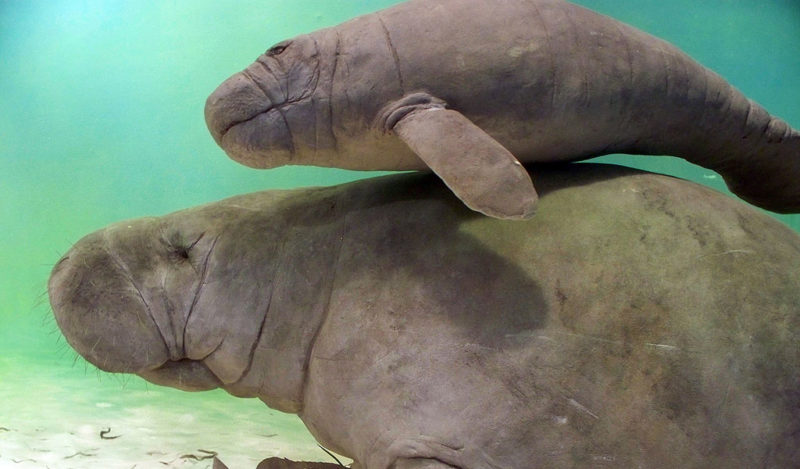Several high-profile and international organisations will launch a new non-binding multi-stakeholder partnership to curb the capture, trade and consumption of endangered, threatened or protected aquatic mammals, reptiles and birds in West and Central Africa. The announcement of the Abidjan Aquatic Wildlife Partnership will take place during the 12th session of the Convention on Migratory Species Conference of the Parties (CMS COP12).

The convention will be held in Manila, The Philippines from October 22 to 28, 2017. OceanCare, the USAID-funded West Africa Biodiversity and Climate Change (WA- BiCC) Programme, Wild Migration and the World Bank have supported the Abidjan Secretariat in forming the Partnership. Together these organisations will draw attention to the plight of aquatic species including endangered, threatened and protected species, and support governments, the private sector and local communities to take the critical steps to ensure their survival.
Evidence shows that the majority of countries in West and Central Africa contribute to the over-harvest of aquatic wildlife in several ways. This includes by-catch, as well as other forms of capture for human consumption, fishing bait, traditional medicine and other uses. While wild animals have always been a food source, increased global population and demand has led to the drastic over-exploitation of several species. Illegal, under regulated and/or fishing on several levels – from the local to the international – has threatened not only the species themselves but the local and national economies who depend on a well-managed aquatic resource base. The capture and consumption of species such as dolphins, whales, manatees, crocodiles and sea turtles, known as ‘aquatic wild meat’, is ‘falling through the cracks’ between environment and fisheries ministries, agencies and international processes. Private companies troll the waters off the West and Central African coasts and capture not only targeted species, but several others that become trapped in their nets.
The Convention of Migratory Species of Wild Animals (CMS) provides an ideal setting for the launch of the Abidjan Aquatic Wildlife Partnership1. The slogan for this years’ conference is “Their Future is Our Future: Sustainable Development for Wildlife and People”, a fitting concept for the launch of the partnership, which seeks to address links between the degradation of natural habitats and species, and issues of poverty, food security, human health, including impacts on local and national economies. Many drivers behind the increased demand for aquatic wild meat are the same issues identified within the UN’s 2030 Agenda for Sustainable Development and its Sustainable Development Goals (SDGs). A growing reliance of people on unsustainable food sources such as endangered, threatened or protected species has clear implications for the future economic prosperity and well-being of people, but also represents a grave conservation and animal welfare concern.
- In West and Central Africa alone, at least 20 countries are known to carry out specialised hunts for the West African Manatee.
- Cetaceans are killed and their meat is consumed at high levels throughout the region. Ghana is thought to represent a particular hotspot in the region for hunts of dolphins and small whales with at least 16 species affected. In some cases, dolphins are landed as by-catch but directed hunts also occur and in some places where they are used as shark bait.
- Sea turtles are killed for their meat and shells, as well as their eggs. As females lay the eggs, poachers collect them and often kill the females at the same time. Turtle meat is regularly sold in African countries including Nigeria, Mauritania, Cabo Verde, Senegal, Côte d’Ivoire, and Guinea.
- Aquatic species are also killed for medicinal and ornamental purposes. For example, turtles are used for traditional medicine in the Gambia, Guinea Bissau, Sierra Leonne, Ghana, Togo and Benin. Turtle shells are sold to tourists throughout the region.
- Crocodiles are caught and killed in significant numbers for meat which is sold in markets in Nigeria.
Aquatic Wild Meat at CMS COP12
At CMS COP12, governments will consider adopting a resolution which highlights issues that affect many migratory aquatic species listed in the appendices of CMS. In particular it expresses concern that these species are being harvested in an illegal or unregulated manner and that demand for the meat or other products of these species is increasing. The resolution asks that CMS gives the issue increased attention by setting up an international working group of experts to focus on the issue and to provide advice to governments.
The hope is that the outcome of the new CMS Aquatic Wild Meat Working Group, if agreed by the parties, would benefit the Abidjan Aquatic Wildlife Partnership and work collaboratively within or alongside it.
The organisations supporting the development and of the Abidjan Aquatic Wildlife Partnership will not only be encouraging governments to adopt this resolution but also to take this fight back to their home countries and reinforce their commitment to ensuring that endangered and threatened migratory aquatic species not only survive, but thrive.
